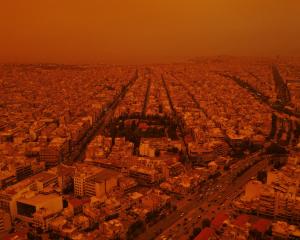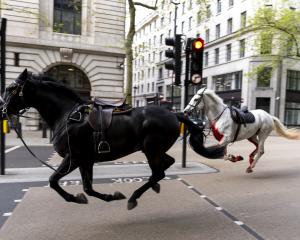A record tourism year may be a boost for Spain's struggling economy, but in one corner of Barcelona residents are furious about drunken holidaymakers and a new fad for carousing naked in public.
People of La Barceloneta, tucked behind a beachfront which attracts millions of visitors a year, have taken to the streets several days in a row to protest against a rise in unruly tourism and to demand more control over low-cost accommodation.
The marches come after complaints of raucous late-night partying, increasing litter and drunken antics like the fad for nudity around town, captured by residents in photos published in national newspapers.
Welcome beautifulls. Ellas dicen que este turismo es mejor que el del incerso. Yo la verdad ...... pic.twitter.com/GDN3QVixwb
— vicens forner puig (@vicensforner) August 21, 2014 Barcelona's city hall on Friday (local time) said it would create new inspection teams to carry out door-to-door searches in the neighbourhood to locate illegal tourist flats, which residents blame for anti-social tourism.
"We don't want tourist flats in the neighbourhood, with or without licences," read a statement on the Facebook page used by locals to organise the latest protest on August 21.
The city government said it was sending a council member to meet residents on Friday and promised more police in the area and a phone bank to take complaints.
Barcelona, in the northeastern Catalonia region, has already had a crackdown on home rental websites for marketing illegal short-term room lets, fining Airbnb over the practice in July.
Residents of La Barceloneta, once a small fishing village, have been draping their balconies with banners calling on visitors to respect their sleep and the neighbourhood for years.
The number of international tourists to visit Catalonia - the most visited region in Spain - rose nearly 6 percent to 9.3 million in the first seven months of the year compared with 2013, data from the Industry Ministry showed on Friday.
Across Spain, there were 7 percent more foreign visitors compared with January-July in 2013, which was a record year for tourism - broadly welcomed by the country as it emerges from a deep recession. The sector accounts for roughly 10 percent of the economy.
But hotel stays by foreign tourists in July were down 1.8 percent, according to a National Statistics Institute report.
"Tourists want to cut costs and there is growing demand for alternative accommodation," said Josep-Francesc Valls, a marketing professor at the Esade business school.
Better controls and taxation of tourist flats would help end "drunken tourism", he added. "This degrading type of tourism has to be stopped." (Additional reporting by Robert Hetz in Madrid, Writing by Sarah White; Editing by Elisabeth O'Leary and Andrew Roche)












